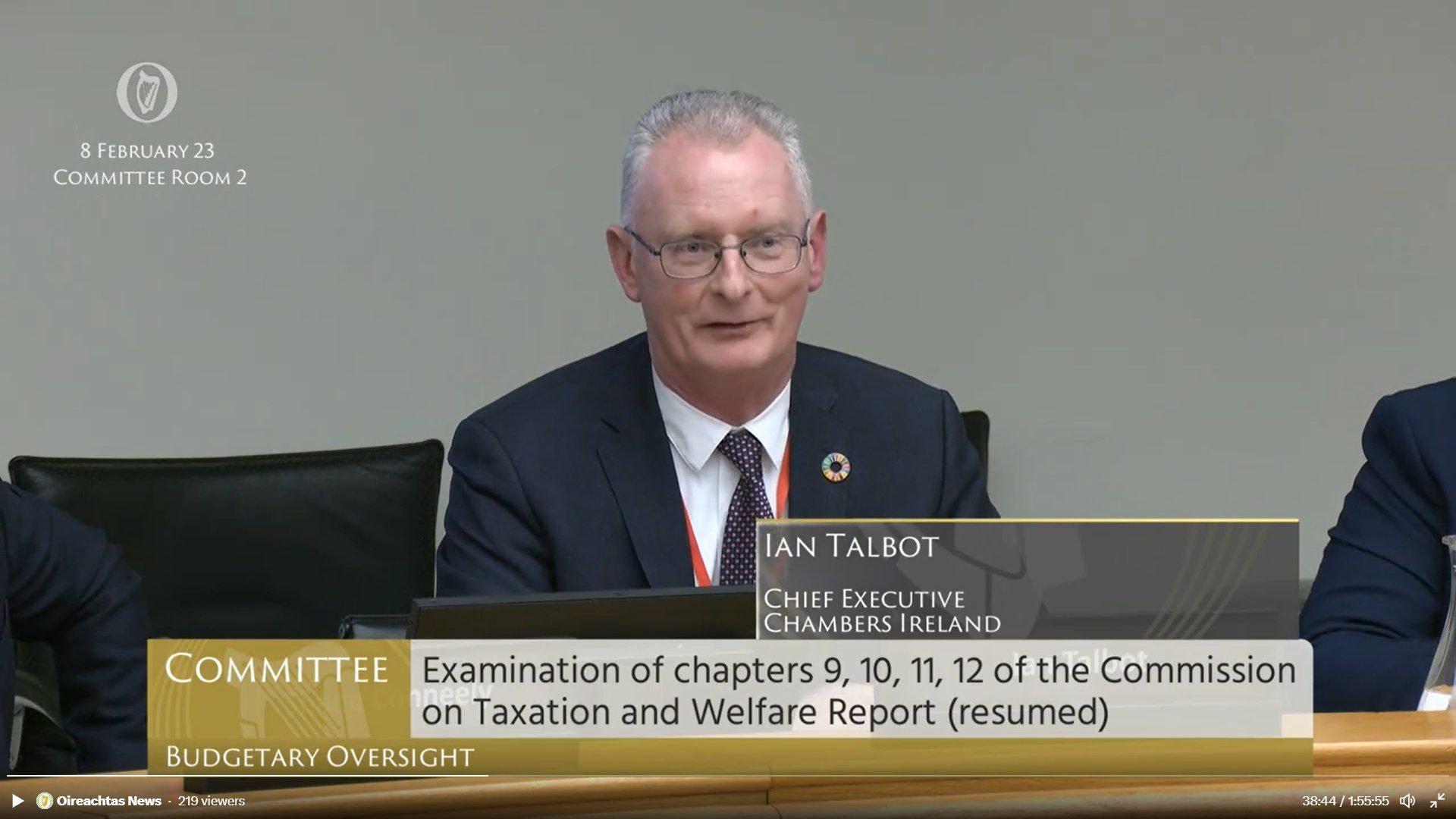Chambers Ireland Introductory Remarks to the Budgetary Oversight Committee

Ian Talbot, Chief Executive of Chambers Ireland, introductory remarks for the Committee on Budgetary Oversight
Broadly, Chambers support the recommendations of the report of the Commission on Taxation and Welfare.
Specifically, we agree that it is necessary to broaden the tax base, when taxation focuses too much on a narrow range of economic activities this can lead to erratic exchequer returns when even minor economic shocks affect those areas. Given that Ireland is a small, open economy we experience far more economic volatility than is to be expected in other states. Consequently, a prudent approach to take, regarding our tax base, would be to ensure that it is even broader than what would be typical of a larger, less trade-reliant, country.
As we saw following the housing bust of the late 2000’s, and the associated crash in stamp duty payments, relying disproportionately on any particular sector makes government finances fragile. Chapter 9, “Promoting Enterprise”, is the area where we have the strongest views.
Chambers Ireland’s Overarching Perspective on Corporation Taxes and Business Incentives:
Ireland’s continued over-reliance on the Corporation Taxes receipts of a handful of companies to support current expenditure means that even when our economy is strong, our national accounts are brittle – Changes in US domestic tax codes could greatly impact our State’s capacity to deliver services for our people.
While there is a need to diversify our tax base, diversity can take many forms, and Chambers Ireland’s position is that our domestic economy underperforms, and that this is part of our ‘overreliance’ discussions.
Government and the State need to have a greater focus on ensuring that our cities and towns become attractive places to live and work. A diversified, and thriving, domestic economy will leave us less vulnerable to external shocks.
A feature of Irish public enterprise policy has been an overly tight focus on ‘early stage’ ‘high risk’ businesses. While those firms are an important part of the economy, that strategy will not create a broad and robust public finances environment as very few companies will qualify for admittance into such a category, and by their nature most will not succeed to the point that their taxes become a notable share of corporate taxation. Therefore, even if such a strategy is a net positive re: economic growth, all else being equal, the exchequer will continue to rely on the same few large companies for the bulk of Corporation Tax.
We were glad to see that the Commission recommended that tax-based policies have a role in supporting productivity and employment growth among Small and Medium Enterprises (SMEs), however we regret the Executive Summary’s editorialisation that they should be targeted towards “early-stage, high-risk” and “research and development- intensive” businesses. These two areas are important, but in the first case they are unlikely to become taxpayers (given the high failure rate of business start-ups in high-risk sectors) meanwhile the research related tax credits have, in practice, only proven to be useful for larger firms.
It is highly likely that a successful new business will be part of an evolution of old sectoral business practices rather than a disrupter of a sector. If we were cynical, we would suspect that restricting tax policy measures to a limited set of high potential firms is a means of avoiding using tax-based measures to support new firms, while not explicitly saying that that is the aim.
In contrast, a broad-based economic growth strategy that works for businesses across sectors and sizes of firms has a greater chance of growing the one euro in six of Corporation Tax that comes from locally-owned companies than a strategy that is reliant on unicorns.
In the meantime, and for as long as there are there are excess returns within Corporation Tax receipts, Chambers Ireland supports their use to fund our long-neglected infrastructure investment. This much needed investment will be far more expensive if funded through debt. It is vital that if Corporation Taxes are being spent, they should be invested in capital rather than funding current expenditure.
Chambers Ireland strongly advocates for sustainable infrastructure that will reduce the hidden productivity and competitiveness costs associated with congestion, poor housing, and energy supply uncertainty; infrastructure investment is the most effective way to ensure that future decades will experience fewer constraints on growth.
Where it is not possible to finance such projects in the short run, then the state should create a climate transition infrastructure financing entity where the excess Corporation Tax receipts can be sequestered.
– Ends –
Notes for the Editor:
Full Submission available here: Submission to the Budget Oversight Commission
Key points are:
- Industrial and Taxation Policy should focus on developing the domestic economy
- Taxation needs to be addressed holistically and not piecemeal
- There is an urgent need to broaden the tax base
- Relying disproportionately on any particular sector makes government finances fragile
For Further Information:
Shane Conneely, Director of Policy and Communications, 086 3244 940 or email shane.conneely@chambers.ie
About Chambers Ireland:
Chambers Ireland is the voice of business throughout Ireland, with 40 member chambers across every major city, town and region of the island. Aligning our strategic priorities with the UN’s Sustainable Development Goals, our aim is to make places better to live, work and do business
